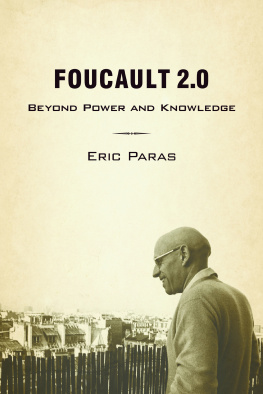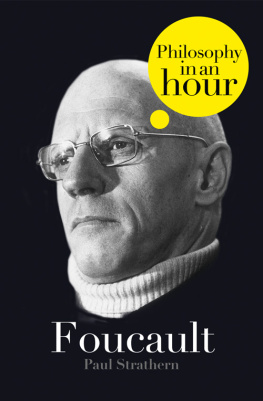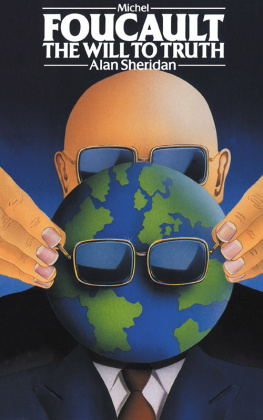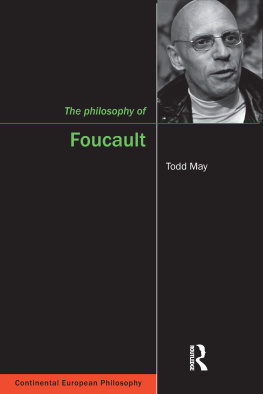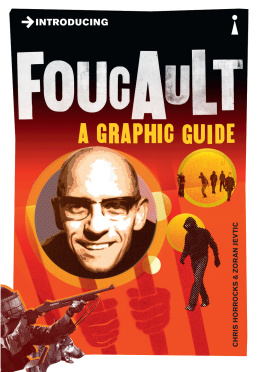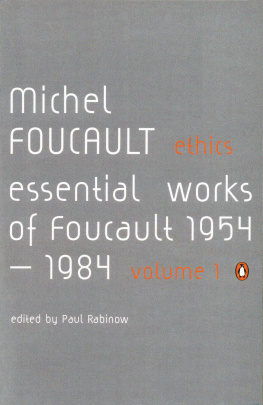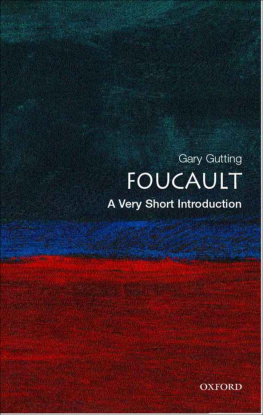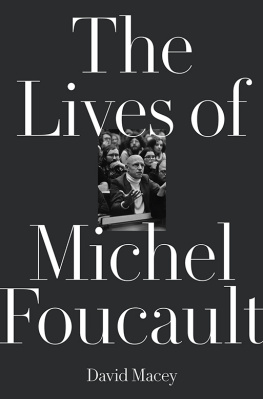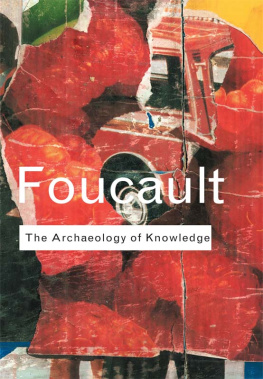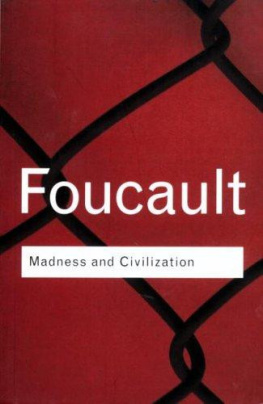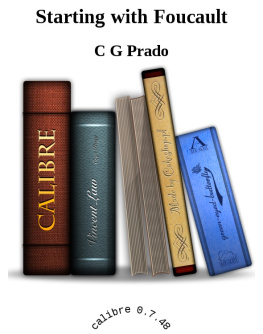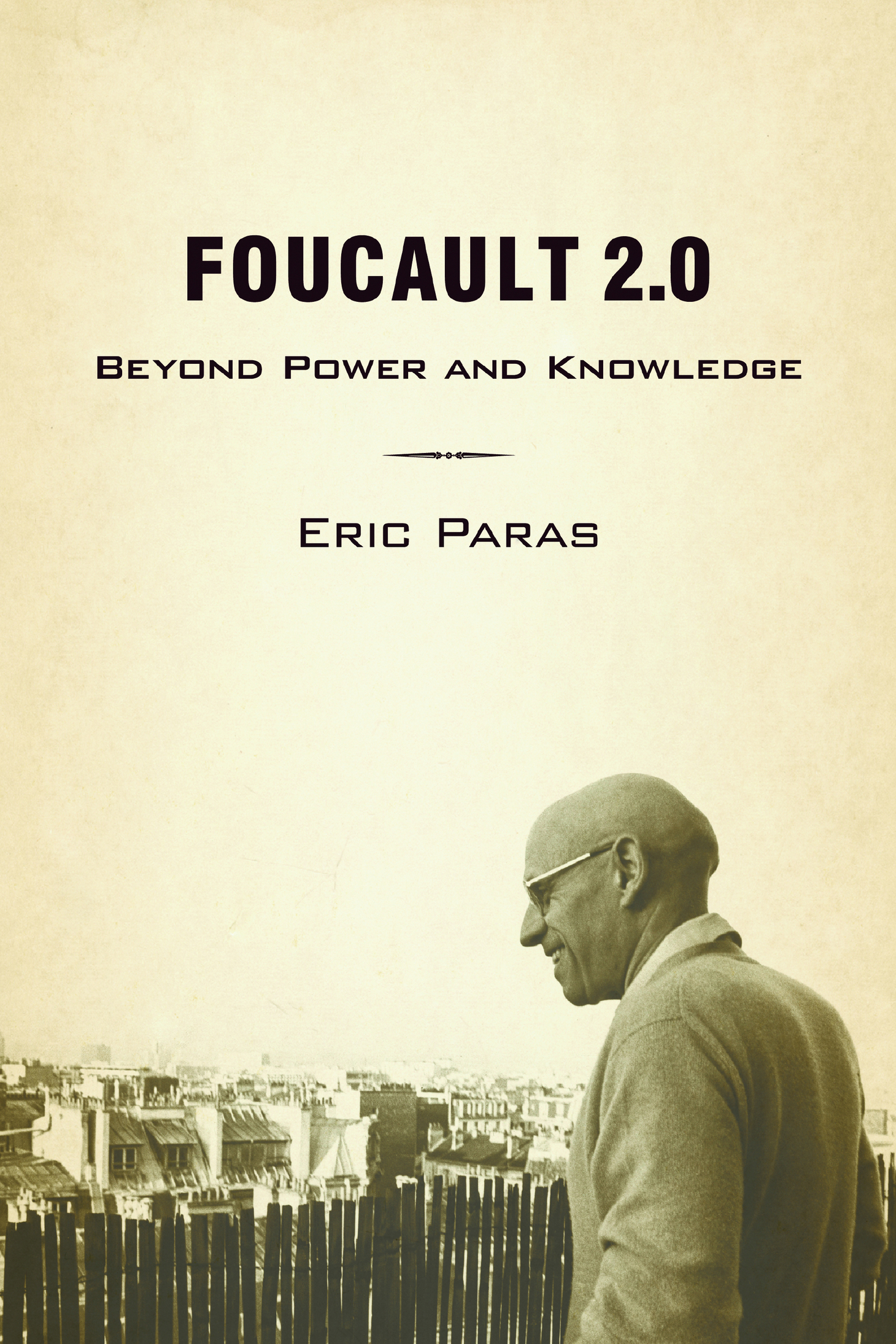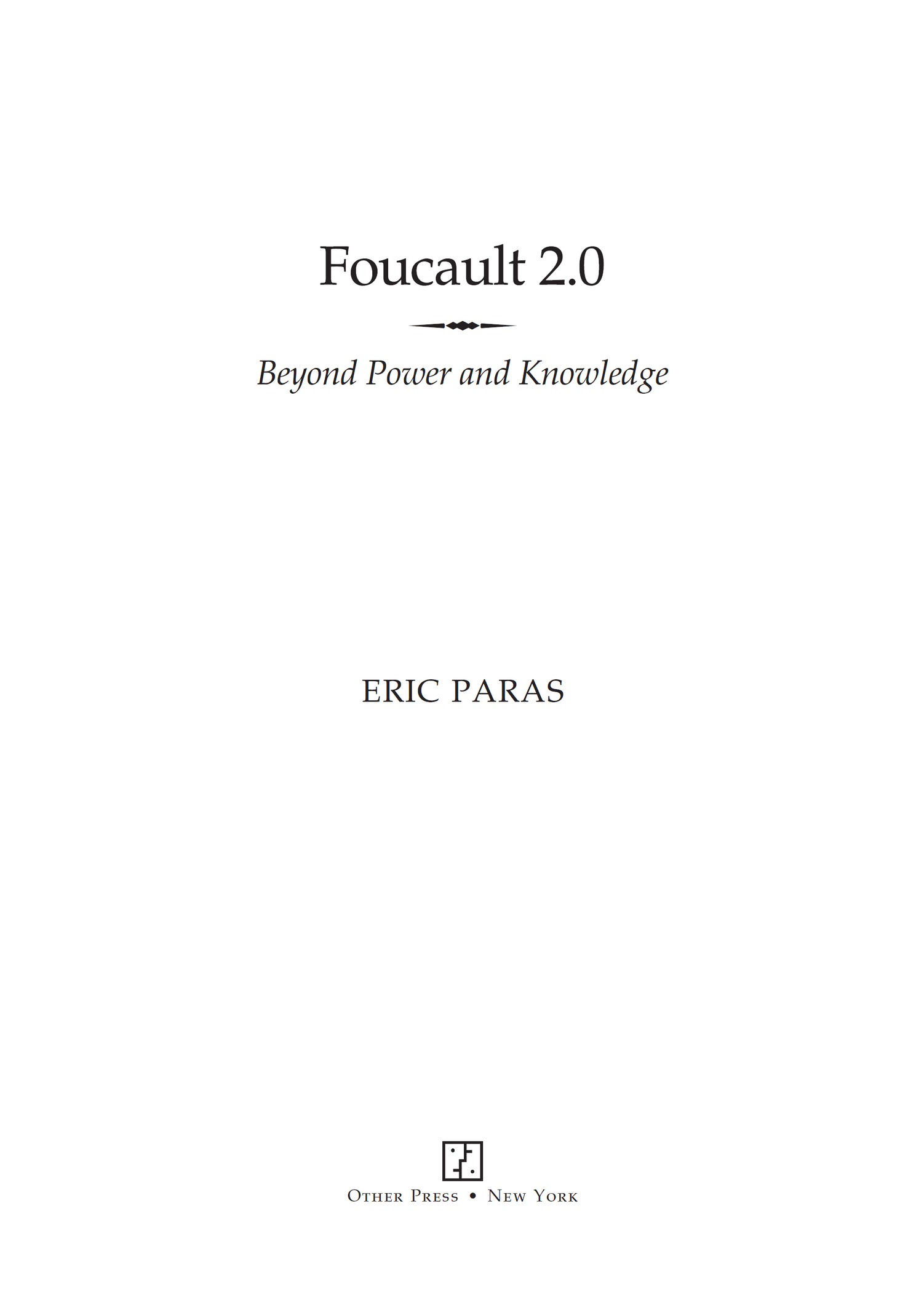Production Editor: Mira S. Park
All rights reserved. No part of this publication may be reproduced or transmitted in any form or by any means, electronic or mechanical, including photocopying, recording, or by any information storage and retrieval system, without written permission from Other Press LLC, except in the case of brief quotations in reviews for inclusion in a magazine, newspaper, or broadcast. For information write to Other Press LLC, 267 Fifth Avenue, 6th Floor, New York, NY 10016. Or visit our Web site: www.otherpress.com.
Paras, Eric.
Foucault 2.0 : beyond power and knowledge / Eric Paras.
p. cm.
Includes bibliographical references and index.
1. Foucault, Michel. I. Title: Foucault two point zero. II. Title.
Acknowledgments
This book was not written without the accumulation of a great many debts. The greatest of these have accrued to my mentors at Harvard: David Blackbourn, Peter Gordon, and Charles Maier. Their collective vigilance ensured that no misstep would be fatal. David Blackbourns timely advice, unwavering support, and manifest concern made everything else possible, and for that I am truly thankful. Peter Gordon provided a model of how intellectual history should be done. He also gave freely and generously of his time to ensure that each and every chapter received critical attention. These pages were invariably written with his sharp eye and discerning ear in mind. Charles Maier was an inspiration from my first arrival at Harvard, and a friend to this project at very critical moments.
I am grateful to the many Harvard faculty who shared their time and lent their guidance during the last seven years. Stephen Greenblatt went out of his way to offer his own reflections, as well as needed background information. Susan Ware provided support and encouragement. Mark Kishlansky gave not only valued advice, but demonstration by example of what it means to be a professional historian. I am particularly grateful to Ann Blair, who made the last years of my graduate school experience the best years. Her genuine interest in my intellectual and professional development, to say nothing of my personal well-being, was more than appreciated. A more dedicated scholar, a kinder individual, and a better mentor could hardly be imagined.
It was among colleagues that many of the books most pressing questions were first addressed. I owe a large debt to the participants in the Modern European History Workshop at the Minda de Gunzburg Center for European Studies. Its organizers, Katja Zelljadt and Helena Toth, performed a great and selfless service in making available a forum for the presentation of work in progress. Bo-Mi Choi, Deborah Coen, Chris Hilliard, David Meskill, and Sharrona Pearl each provided extremely useful feedback. I would also like to thank Tom Wolf for his insightful comments and thought-provoking conversations.
The helpful and dedicated staff of Harvards Widener Library was an invaluable aid to my research. So, too, were the staffs of the Fondren Library of Rice University, and of the Bibliothque Gnrale of the Collge de France. The Minda de Gunzburg Center for European Studies made the truly innovative aspects of the work possible with a generous research grant. A much-appreciated fellowship from the Mrs. Giles Whiting Foundation enabled me to complete the project with at least a portion of my hair not yet silver.
Finally, I would like to thank my wonderful family. My wife Jenifer shared every moment of this project with me. My son Edward, to my great delight, shared the final ten months. What is good in these pages came from them.
INTRODUCTION

Into the Archive
A FTER MORE THAN FOUR YEARS OF LABOR IN THE FOOTSTEPS OF Michel Foucault, I have developed a tremendous admiration for the man, both as a philosopher and as an individual. Foucaults concern for the preservation and expansion of human freedom was unwavering. In its service, he deployed a critical intellect matched by a writing style of rare sublimity. He had a rich sense of humor, one that perhaps came across most forcefully when he spoke. As I listened in their entirety to twelve of the thirteen semester-length lecture courses that Foucault offered at the Collge de France, Foucault made me gape, reflect, and laugh out loud on a number of occasions, often to my considerable embarrassment. He also taught me more than any other single scholar under whom it has been my privilege to study.
Arnold I. Davidson observed that, with the 1994 publication of the more than three thousand pages of text comprising Foucaults Dits et crits, it had become possible, and even necessary, to undertake a reevaluation of Foucaults place in twentieth-century intellectual life. But, Davidson hastened to add, We have still not yet reached a firm and stable position, since his courses from the Collge de France, still unpublished, go well beyond anything that can be found in his books or in Dits et crits. Davidsons reflection was, in a way, the starting point for this work.
This book represents the first broad-based historical study to make full use of Foucaults lecture courses from the Collge de France. It employs the courses as a complement to publicly available sources, and treats each course as a discrete work with a distinct message. Davidsons contention that access to the course material would have a transformative effect upon our understanding of Foucaults project is, in the event, more than vindicated. Each individual course is a unique and original foray into a research topic that Foucault considered to be of present importance. As distinct from Foucaults major published works, no time lag separated the appearance of these lectures from the spark of interest that prompted them, while three or more years would often elapse between the genesis of one of Foucaults projects and the appearance of a book on the subject. The courses have a stunning immediacy: the lectures are filled with references to current world events, to books that have recently come into print, and even to headlines from the mornings newspaper.
Taken together, the courses represent nearly two hundred hours worth of speech: a remarkable expansion of the documentation available to us. They reveal a side of Foucault with which many devoted readers of the philosopher would be unfamiliar. Speaking before a large audience week after week on ideas that were typically half-formed and conjectural, the philosopher invariably appeared composed, prepared, and engaged; yet his seriousness of demeanor was a powerful foil for a personality that tended to the playful and irreverent. No transcription of these courses is likely to convey the fact that Foucaults audiences rarely escaped his lectures without laughtereven when the topic of discussion was as grisly as multiple homicide, or as dry as fifth-century baptismal practices.

